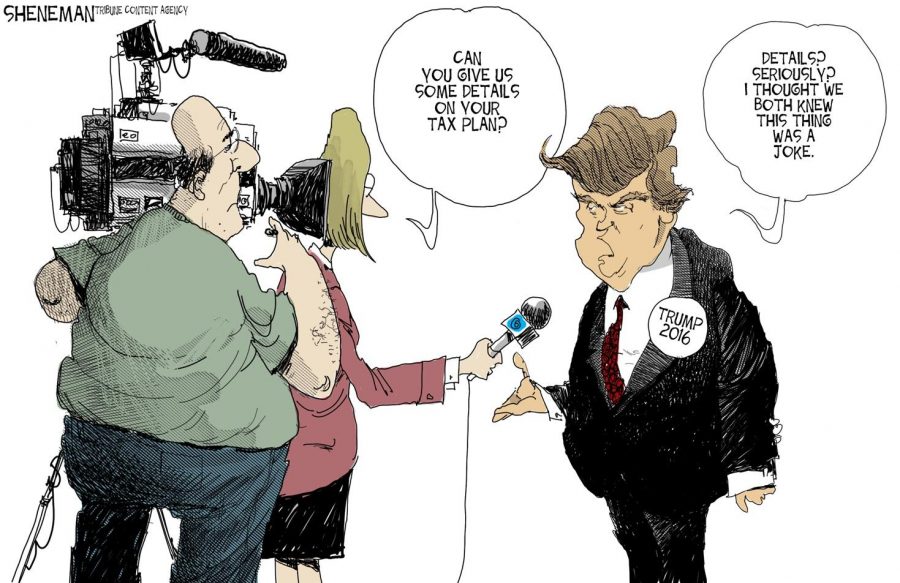Forget the Fairness Doctrine — the American media now follows a new policy: pump ratings and cover the outrageously entertaining.
The Federal Communications Commission introduced the Fairness Doctrine as policy in 1949, and Congress reaffirmed the policy in 1954. The media identified the doctrine mainly by its provision that broadcasters provide equal coverage — if not equal time — to opposing views on controversial “issues of public importance.” Although many — including the plaintiff in the landmark 1969 Supreme Court case Red Lion Broadcasting Co. v. FCC — made the case that it infringed on broadcasters’ freedom of speech, the doctrine lasted until 1987, when the FCC itself decided to abolish the practice.
With today’s 24-hour news cycle and expanded digital landscape, the media has gradually become less objective in coverage. A 2012 Pew Research Center poll found that 77 percent of those surveyed said the media “tends to favor one side” compared with 53 percent who said so in 1985.
Whether it’s because of the industry’s political agenda or simply because of the need for higher ratings in a shrinking news economy, the media’s near tabloid-style coverage is a real problem our nation needs to fix.
The movement toward entertainment-oriented news affects both sides of the political spectrum. According to a 2014 Pew Research Center poll, the increasing reliance on partisan and ideological news sources on the right and left entertainment outlets dominating the field are news sources for the “consistently liberal” and “consistently conservative.” Thirty-four percent of self-described “consistently liberals” cited the expressly comedic Daily Show as their primary source for information, and more than eight in 10 “consistently conservative” subjects cited Fox News’ less explicitly comedic entertainment as their primary source.
With an overcommercialized culture of entertainment dictating coverage by the mainstream news industry, the candidacies of presidential hopefuls like Donald Trump have gained significant traction. Seth Grossman described Trump as the “presidential candidate that reality TV made,” in an op-ed for The New York Times. CNN’s Sept. 16, GOP primary debate featuring the billionaire candidate brought in an estimated 22.9 million viewers, over 6 million more than the network’s previous record.
Maybe, as Kentucky Senator and GOP presidential candidate Rand Paul suggested in a July interview on Face the Nation, the “billion dollars worth of free advertising” Trump has been receiving from virtually all corners of the media since he declared his candidacy has helped him “get [his] message out.”
The willful ignorance of the mainstream media toward lesser-known candidates is not only morally shameful, but harmful to diversity in both parties. Even without FCC fairness mandates, media outlets should recognize their responsibility in alerting the general public to smaller campaigns to allow them to make informed decisions. It is the media’s job to inform the general public and present objective facts.
Certainly, lack of attention hasn’t hindered Trump’s message — if you could call it that . His absurdly impractical centerpiece policy of building a wall at the Mexico-U.S. border transformed from a rarely mentioned, fringe idea to an essential Republican candidate policy almost overnight. “What will you do about illegal immigration?” suddenly became a hot question at debates.
Why has Trump’s campaign received so much attention? The amount of time CNN lavished on him at the most recent debate — 18:47 minutes, surpassing Jeb Bush who clocked in at 15:48 minutes — was so high that Trump’s front-runner status alone can’t explain it. Many of the other candidates parroted or even outdid the extremism of the same anti-immigrant policies that helped popularize Trump. Gov. Chris Christie of New Jersey wants to track foreigners like FedEx packages, and Ben Carson wants to employ armed military drones at the border. Even Sen. Lindsey Graham of South Carolina has echoed Trump’s desire for a repeal of birthright citizenship. The amount of air time the media gives Trump’s absurd policies — which has affected poll numbers — is also dictating the this election’s policies.
The simple answer is that Trump’s outrageous packaging is a cash cow for entertainment-based news — particularly his convictions about immigrants from Mexico, “They’re bringing drugs. They’re bringing crime. They’re rapists.” The longer the media can sustain his campaign, the longer it will.
The media should give people what they want — and they want to hear about Trump. However, that argument can’t defend CNN’s devotion of a whopping 78 percent of its primary coverage to the candidate leading up to the Sept. 16, debate. Trump, whose support in Real Clear Politics aggregated polls never topped 30.5 percent, doesn’t deserve that amount of coverage by merit of his ideas.
Even if Trump’s support did reflect his media coverage, the media would still have a moral responsibility to be more equal in its coverage of the GOP field. It’s very probable that candidates who poll beneath 1 percent have something valuable to add to the conversation.
Today’s mainstream media outlets are kingmakers early in the election cycle. With or without the Fairness Doctrine, they should acknowledge journalism ethics and realize the candidates that make them the most money might not be the candidates who are best for the country.
Henry primarily writes on government and domestic policy for The Pitt News.
Write Henry at [email protected].



